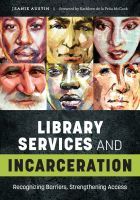
Library Services and Incarceration – Recognizing Barriers, Strengthening Access
Recognizing Barriers, Strengthening Access
- Publisher's listprice GBP 44.00
-
21 021 Ft (20 020 Ft + 5% VAT)
The price is estimated because at the time of ordering we do not know what conversion rates will apply to HUF / product currency when the book arrives. In case HUF is weaker, the price increases slightly, in case HUF is stronger, the price goes lower slightly.
- Discount 10% (cc. 2 102 Ft off)
- Discounted price 18 919 Ft (18 018 Ft + 5% VAT)
Subcribe now and take benefit of a favourable price.
Subscribe
21 021 Ft

Availability
Estimated delivery time: In stock at the publisher, but not at Prospero's office. Delivery time approx. 3-5 weeks.
Not in stock at Prospero.
Why don't you give exact delivery time?
Delivery time is estimated on our previous experiences. We give estimations only, because we order from outside Hungary, and the delivery time mainly depends on how quickly the publisher supplies the book. Faster or slower deliveries both happen, but we do our best to supply as quickly as possible.
Product details:
- Publisher MP–ALA American Library Assoc
- Date of Publication 30 June 2020
- Number of Volumes Paperback
- ISBN 9780838949450
- Binding Paperback
- No. of pages160 pages
- Size 254x177x11 mm
- Weight 367 g
- Language English 75
Categories
Short description:
Provides librarians and those studying to enter the profession with tools to grapple with their own implication within systems of policing and incarceration, melding critical theory with real-world examples to demonstrate how to effectively serve people impacted by incarceration.
MoreLong description:
Foreword by Kathleen de la Pena McCook
This book provides librarians and those studying to enter the profession with tools to grapple with their own implication within systems of policing and incarceration, melding critical theory with real-world examples to demonstrate how to effectively serve people impacted by incarceration.
As part of our mission to enhance learning and ensure access to information for all library patrons, our profession needs to come to terms with the consequences of mass incarceration, which has saturated the everyday lives of people in the United States and heavily impacts Black, Indigenous, and people of color; LGBTQ people; and people who are in poverty. Jeanie Austin, a librarian with San Francisco Public Library's Jail and Reentry Services program, helms this important contribution to the discourse, providing tools applicable in a variety of settings. This text covers practical information about services in public and academic libraries, and libraries in juvenile detention centers, jails, and prisons, while contextualizing these services for LIS classrooms and interdisciplinary scholars. It powerfully advocates for rethinking the intersections between librarianship and carceral systems, pointing the way towards different possibilities. This clear-eyed text
- begins with an overview of the convergence of library and information science and carceral systems within the United States, summarizing histories of information access and control such as book banning, and the ongoing work of incarcerated people and community members to gain more access to materials;
- examines the range of carceral institutions and their forms, including juvenile detention, jails, immigration detention centers, adult prisons, and forms of electronic monitoring;
- draws from research into the information practices of incarcerated people as well as individual accounts to examine the importance of information access while incarcerated;
- shares valuable case studies of various library systems that are currently providing both direct and indirect services, including programming, book clubs, library spaces, roving book carts, and remote reference;
- provides guidance on collection development tools and processes;
- discusses methods for providing reentry support through library materials and programming, from customized signage and displays to raising public awareness of the realities of policing and incarceration;
- gives advice on supporting community groups and providing outreach to transitional housing;
- includes tips for building organizational support and getting started, with advice on approaching library management, creating procedures for challenges, ensuring patron privacy, and how to approach partners who are involved with overseeing the functioning of the carceral facility; and
- concludes with a set of next steps, recommended reading, and points of reflection.




